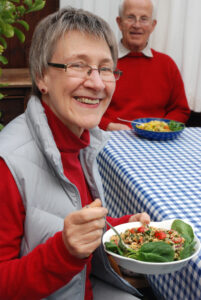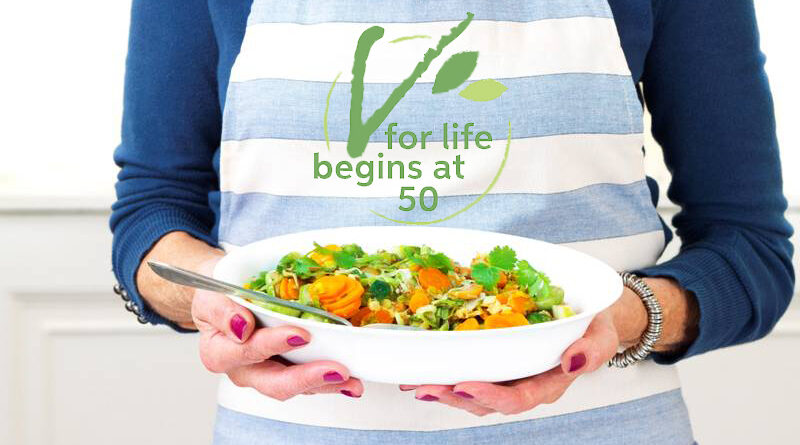Q&A: V FOR LIFE
Worried about being able to stay vegan even when, perhaps, you aren’t in charge of your own cooking? Then you need V for Life. We chat with Chief Executive Amanda Woodvine …
What is V for Life?
People are sometimes surprised to find out that a charity for older vegans, V for Life, exists. Some even respond by asking, “Why does there need to be a charity for older vegans?” Not every older vegan needs support, but many do.
In 2008, the charity was launched to ensure that no one is forced to give up their veganism because of age-related issues. Supporting more vulnerable vegans is crucial for veganism to be an inclusive movement. Becoming clued-up on issues facing older vegans is a key way to do this.
What are the issues that V for Life helps to address?
Issues specifically affecting the ageing vegan community can be introduced in three Cs: Care, Cooking, and Company.
Care
People rarely envision themselves needing care when they get older. Yet 410,000 people – about the population of Bristol – live in care homes in the UK today.
Currently, vegans make up only a very small amount of these care homes residents, but the number is rising.
Think for a moment how you would feel as a vegan moving into a care home. Do you know whether the home will provide vegan meals? Will your food be prepared separately to meat in the kitchen? Will you get a range of meals, or the same every day? Will the chef understand your nutritional needs? If you developed dementia, would they feed you meat?
V for Life is working across the UK to make sure care establishments have the right answers to these questions. Over 1,500 homes have signed up to V for Life’s UK List of veggie-friendly care homes so far. Becoming a List member is free and means the care home will receive sample meal plans, caterer training, ongoing publications in the post, and more. They also get a certificate and window sticker, and free promotion on our website, showing that they are leading the way in inclusivity for older vegans and vegetarians.
The UK List is an essential resource for vegans moving into care, but currently only 13% of UK care homes are members. There is no guarantee that the remaining 87% understand a vegan’s belief system and know how to respect it.
In 2018, one of my colleagues was approached by a vegan care worker, who saw V for Life’s stall at an event. She saw first-hand how appallingly vegans can be treated in care settings. A paralysed resident arrived at the care home where she worked, who was said to be ‘fussy about eating’. It transpired that this resident was ‘fussy’ because she was refusing to swallow meat, because she was vegan. She was extremely lucky to have been found by this vegan care worker, who brought her meals from home for the last few weeks of her life.
This is not good enough. V for Life wants veganism to be as well respected as halal and kosher meal requirements. This extends to the issue of dementia. If a Muslim or Jewish resident with dementia requests pork, there will be great reluctance to provide it. While veganism is not a religion, for many vegans it is the strongest belief they have.
Yet vegans living with dementia are typically given meat or dairy products when they ‘ask’ for them; and care staff may even offer these to them, unasked. Staff often give the resident meat with good intentions, thinking they are being compassionate by providing residents with a ‘treat’. But if the resident or their family realises what’s happened a few days later, it can be highly distressing.
We’ve made a short film which draws attention to this issue, which you can find on the films section of the V for Life website. There are ways to protect people with dementia from losing their beliefs. Providing alternatives to meat and dairy, taking care to avoid actively offering a vegan animal products, and having a veggie-only dinner table are possibilities with great potential.
Making care settings a safe space for older vegans is currently one of V for Life’s biggest projects.
Cooking
 Older vegans who live independently can also face issues when it comes to mealtimes.
Older vegans who live independently can also face issues when it comes to mealtimes.
Meals on Wheels services can support people to live independently for years, preventing the need for residential care. But they rarely offer vegan options. V for Life has a grants scheme for older vegan individuals in financial difficulty, which also funds organisations that support them. One of these is a completely vegetarian Meals on Wheels scheme in Leicester. If you know someone who could benefit from a grant, take a look at The Vegetarian and Vegan Fund on our website.
Some older vegans don’t need Meals on Wheels, but find it challenging to prepare meals every day. Many older vegans don’t live near supermarkets with a decent vegan ready-meal range, or don’t have the internet to order online. For this reason, V for Life produced the booklet, Dinners to your Door – a completely vegan meal-delivery guide.
Appetites often fade as we get older and, for those who need a little motivation, our chefs have produced some inspiring free recipe guides. Cooking for One is perfect for people who live alone. Take V includes five-ingredient recipes which are quick, easy and tasty. For a full list, check out the publications page on the V for Life website.
Also, did you know that as you get older your dietary needs change? For example, the amount of protein you need goes up, but the amount of protein you can absorb in one sitting goes down. V for Life’s nutrition guide can be used by any vegan over 50, to ensure that their specific dietary requirements are being met.
Company
 This is an issue affecting the older population of the UK, not just vegans. A recent government survey reports that over 24% of over 60s say they feel lonely. Loved ones pass away, mobility decreases, and many older people find it difficult to meet new people. Nowadays this is often done online – and the COVID-19 pandemic has further heightened this trend.
This is an issue affecting the older population of the UK, not just vegans. A recent government survey reports that over 24% of over 60s say they feel lonely. Loved ones pass away, mobility decreases, and many older people find it difficult to meet new people. Nowadays this is often done online – and the COVID-19 pandemic has further heightened this trend.
In a bid to combat loneliness among the older vegan population, V for Life introduced a pen- and phone-pal scheme. Many older people don’t know any other vegans or vegetarians and having the opportunity to speak with someone who shares your belief can be empowering. Older vegans and vegetarians are linked up across the UK and form new friendships.
Many vegetarians and vegans may worry what will happen if they get dementia or aren’t able to communicate their dietary needs. Personally, I hate the thought of being served up a plate of meat and unable to explain why I won’t eat it. What can you do to help?
V for Life is working hard to encourage more care homes to offer appropriate vegan options for their residents, and to help homes understand the challenges of supporting those living with dementia. A growing number of care homes have signed up to the charity’s Memory Care Pledge. This is to help ensure that vegans or vegetarians who have capacity issues, or cognitive losses, will be offered a choice of meals, drinks and snacks that uphold their ethical beliefs.
And for individuals, we have put together five ways to futureproof your vegan diet from dementia. Read online, or contact us for a printed copy.
What next for V for Life?
Like most organisations, the COVID-19 pandemic has affected the way that V for Life works.
In early 2020, we switched to running online cookery demonstrations. This is a free service that we usually offer in person but have adapted to work online over the social communication channel, ‘Zoom’. If you’re a member of a local community group or organisation in some other capacity, and are eager to learn some new recipes, do get in touch.
For individuals, we even run a monthly virtual vegan lunch club. The club is open to vegans, vegetarians, and meat reducers aged 65 and over, and participants buy their ingredients in advance, cook the dishes on the day, and join a Zoom chat at lunchtime. It’s a great chance to talk cookery, recipes and more, and meet likeminded people from across the UK.
We’re working towards a future where there doesn’t need a charity for older vegans. One day, all care homes will offer vegan options, everyone will know the protocol with dementia, and fingers crossed, loneliness will get the attention that it deserves.
But until that day comes, can you help us make the UK a safer place for older vegans? If you work at a care establishment, have a loved one in care, or are just happy to visit a care home local to you – take our UK List form to the manager. Visit the Get Involved section of our website for further ways to make a difference.
We’ve got a long way to go, but we’re going to get there!
Where can we find out more?
For more information, please visit V for Life’s website or social media channels:


